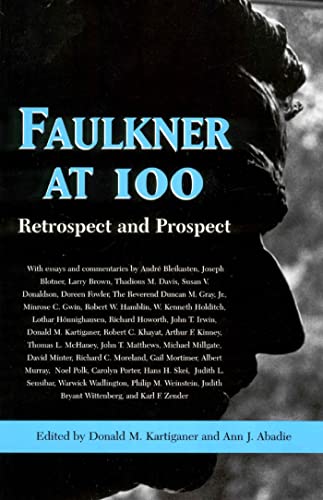All books / Book
Faulkner at 100: Retrospect and Prospect (Faulkner and Yoknapatawpha Series)

| Full title: | Faulkner at 100: Retrospect and Prospect (Faulkner and Yoknapatawpha Series) |
|---|---|
| ISBN: | 9781617038457 |
| ISBN 10: | 1617038458 |
| Authors: | |
| Publisher: | University Press of Mississippi |
| Num. pages: | 336 |
| Binding: | Paperback |
| Language: | en |
| Published on: | 2013 |
Read the reviews and/or buy it on Amazon.com
Synopsis
With essays and commentaries by André Bleikasten, Joseph Blotner, Larry Brown, Thadious M. Davis, Susan V. Donaldson, Doreen Fowler, The Reverend Duncan M. Gray, Jr., Minrose C. Gwin, Robert W. Hamblin, W. Kenneth Holditch, Lothar Hönnighausen, Richard Howorth, John T. Irwin, Donald M. Kartiganer, Robert C. Khayat, Arthur F. Kinney, Thomas L. McHaney, John T. Matthews, Michael Millgate, David Minter, Richard C. Moreland, Gail Mortimer, Albert Murray, Noel Polk, Carolyn Porter, Hans H. Skei, Judith L. Sensibar, Warwick Wadlington, Philip M. Weinstein, Judith Bryant Wittenberg, and Karl F. Zender
William Faulkner was born September 25, 1897. In honor of his centenary the Faulkner and Yoknapatawpha Conference of 1997 brought together twenty-five of the most important Faulkner scholars to examine the achievement of this writer generally regarded as the finest American novelist of the twentieth century.
The panel discussions and essays that make up Faulkner at 100: Retrospect and Prospect provide a comprehensive account of the man and his work, including discussions of his life, the shape of his career, and his place in American literature, as well as fresh readings of such novels as The Sound and the Fury, Sanctuary, Absalom, Absalom!, If I Forget Thee, Jerusalem, and Go Down, Moses.
Spanning the full range of critical approaches, the essays address such issues as Faulkner's use of African American dialect as a form of both appropriation and repudiation, his frequent emphasis on the strength of heterosexual desire over actual possession, the significance of his incessant role-playing, and the surprising scope of his reading. Of special interest are the views of Albert Murray, the African American novelist and cultural critic. He tells of reading Faulkner in the 1930s while a student at the Tuskegee Institute in Alabama.
What emerges from this commemorative volume is a plural Faulkner, a writer of different value and meaning to different readers, a writer still challenging readers to accommodate their highly varied approaches to what André Bleikasten calls Faulkner's abiding "singularity."